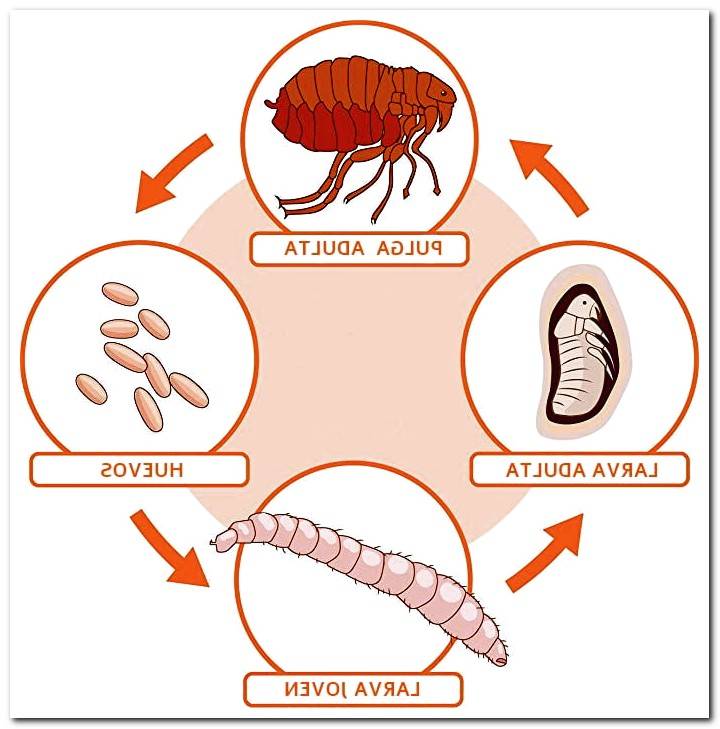
Fleas are external parasites as unpleasant as they are common in our dogs. Observable with the naked eye, we should not only eliminate those we find on the animal. It is essential to also deworm the environment.
For sale we will find products designed to fight fleas, but not all can be used on puppies. Furthermore, these must be dewormed in their first weeks of life. Let’s see in detail how to do it.
Index of contents
- 1 How do I know if my puppy has fleas?
- 2 Flea symptoms in puppies
- 3 The life cycle of fleas
- 4 Products for deworming puppies
- 5 Don’t forget to remove fleas from home
How do I know if my puppy has fleas?
Fleas are insects a couple of millimeters in length, which means that we can see them on our dog’s body or in our house. They are flattened in body, black or reddish in color and have well developed hind legs. These allow them to jump great heights for their small size.
About the dog, they run over the skin, moving quickly between the hairs thanks to the conformation of its body. Therefore, if we detect an insect with these characteristics, we will know that our dog has fleas.
On the other hand, since it is not always possible to see them, discovering in the body or in the resting places of our dog a kind of black grit is another indication of the presence of fleas. That sand is the excrement of fleas. If we wet it we will see that it is dried blood, since they are blood-sucking parasites.
Flea symptoms in puppies
If we have not been able to see the fleas or their droppings, the classic sign of their presence is scratching, since their bites involve itching. In any case, in case of doubt, only the veterinaryn can confirm or rule out the diagnosis, since other problems, such as scabies can also cause intense itching.
Also, there are dogs sensitive to flea saliva in which what is known as flea bite allergy dermatitis (DAPP). These dogs will present, especially in the area above the tail, red spots and alopecic areas, due to intense scratching.
This, if left untreated, ends up aggravating, with wounds, thickening and darkening of the affected skin. A single sting can achieve this reaction. Furthermore, a considerable infestation of fleas is capable of causing anemia in a puppy. Fleas are also transmitters of parasites like tapeworms and diseases like bartonellosis.

The life cycle of fleas
To fight fleas it is essential to know and understand their life cycle. In this way we can implement the most appropriate measures. Adult fleas feed on dogs, cats, or any other warm-blooded animal, including humans. Instead, the females will deposit their eggs in the environment.
Beds, slits or any minimum space will serve as a nest for the eggs. From them hatch larvae that will feed on the organic matter they find, as well as skin remains. Only when they mature do they bite and climb on an animal again.
Given the amount of eggs that fleas can lay, if we treat only the puppy and forget about the environment, in no time we will have a whole new generation of hungry little fleas, which will perpetuate the infestation. If the dog is protected, they will bite us. And nothing protects 100%.
Products for deworming puppies
The flagship product for ridding puppies of fleas is spray, which will generally work against fleas, ticks, and lice. It is applied in a well ventilated place, protecting our hands with gloves and spraying, several times, until the whole body is wet. While the puppy dries, it has to stay in a warm place.
But to be able to use it or not will depend on the age of the puppy and the manufacturer’s recommendations, which is who will tell us, in the prospectus, from when can it be used. The spray, in addition, is not going to be a comfortable option if our dog, although a puppy, is large. Therefore, it is best to consult with the vet.
Let’s not forget that dewormers, although anyone can buy them online, are a veterinary product. The veterinaryn, depending on the characteristics of our puppy, can recommend the use of anti-fleas such as pipettes, pills or collars. Regardless of the chosen one, it is essential to renew it with the indicated periodicity.
Don’t forget to remove fleas from home
Since most fleas will be found growing at home, applying a dewormer to the dog is not enough. Unless the infestation is really severe, in which case it would be indicated to use what is known as a bomb, measures such as these will serve:
- Deworming the puppy and all the animals with which he lives. Repeat the operation as many times as the vet checks.
- Pass a special comb, made of metal spikes and together, through the body of the animal. This utensil catches fleas that may still be left.
- Wash beds and other resting places in the washing machine.
- Vacuum floors and carpets thoroughly.
- Scrub the floors, including under the furniture, with some insecticidal product, wetting them well and letting them act.
